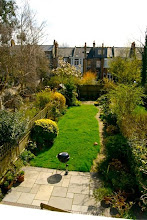Wednesday, 1 January 2014
New Year's Day
So much has happened in the last year: the first anniversary of my second marriage; the monthly deadlines and daily decisions at work; and, in the week before Christmas, leaving a much-loved family house, after over a decade living there. As it happens (and doesn't it so often happen this way?), the builders hadn't finished the house we were supposed to be moving into, and so I put all the furniture into storage, and departed Crouch End with eight suitcases, in a sudden flood of tears.
Since then, I have been hither and thither, until arriving in the Highlands for Christmas and the New Year, whereupon there has been feverish activity (unpacking suitcases, wrapping presents, last minute shopping in Ballater, and the discovery of a wonderful bookshop there, which I highly recommend to anyone with a love of Scottish literature, gardens and history).
And in between these bursts of energy come the inevitable moments of exhaustion, and the occasional yet piercing sense of homesickness. All of which has reminded me this afternoon of Freud's essay, 'The Uncanny', and his quotation therein of the saying, 'Love is homesickness'. In Freud's analysis -- or rather, in my reductive version of his more sophisticated approach -- a man's longing for home might represent a desire to return to his true place of origin, his mother's body. (Intriguingly, the link in Freud's essay between that which is eerie, and yet also uneasily familiar, comes from the German, unheimlich -- meaning uncanny or seemingly supernatural -- and heim, meaning home.)
So where does that leave me, exactly? I have come to love Tillypronie, this house high in the Aberdeenshire hills, surrounded by heather-clad mountains and deep, peat-dark lochs. The first time I came here, in the summer of 2009, I felt an odd -- and yes, almost eerie -- sense of recognition, although perhaps that was because I was already falling in love with the man who brought me here, and who was to become my husband.
Yet the house has always seemed like another woman to me; a maternal guardian, perhaps, to successive generations who love returning here, in every season of the year. All of them have their own memories and childhood associations with the fabric of home; each has a deep and abiding relationship with this peaceful, hidden place. Might that also be true of other houses where I have lived? Certainly, I feel comforted by knowing that my former home in London now belongs to another family with children who will play in the garden, just as mine did in the past; as did those of the previous owner (and doubtless others before them, too).
I'm not quite sure where any of these musings might lead me to on New Year's Day, 2014 -- nowhere in particular, except for the knowledge, as I grow older, that in endings there are also beginnings; and apparently familiar stories can evolve into rather different, unexpected narratives. Here I sit, as winter darkness falls outside, safe within the shelter of ancient walls; where the scent of hyacinths is filling the room. And with that scent comes another remembered fragment -- not Freud, this time, but T.S Eliot:
Frisch weht der Wind
Der Heimat zu,
Mein Irisch Kind,
Wo weilest du?
“You gave me hyacinths first a year ago;
They called me the hyacinth girl.”
—Yet when we came back, late, from the Hyacinth garden,
Your arms full, and your hair wet, I could not
Speak, and my eyes failed, I was neither
Living nor dead, and I knew nothing,
Looking into the heart of light, the silence.
The German lines in that passage of The Waste Land come from Wagner's Tristan and Isolde; the translation, so I am told, is: Fresh blows the Wind/ To the homeland./ My Irish child,/ Where are you dwelling? Like Freud's Uncanny, Eliot's Waste Land continues to confound me, with every passing year -- but somehow, both seem resonant on this, the first day of the year, when the past seems as close as the future, and the world keeps turning, even as we look back and yearn for safety, before moving onwards again...
Subscribe to:
Comments (Atom)









